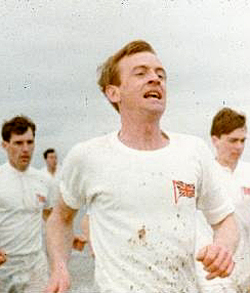Chariots of Fire
Chariots of Fire is a 1981 British historical drama film directed by Hugh Hudson. The film is based on the true story of two British athletes in the 1924 Olympics: Eric Liddell, a devout Scottish Christian who runs for the glory of God, and Harold Abrahams, an English Jew who runs to overcome prejudice.
Plot[edit | edit source]
The film opens with the funeral of Harold Abrahams in 1978. It then flashes back to the early 1920s, where Abrahams is a student at Cambridge University. He is determined to overcome the anti-Semitism he faces and prove himself through his athletic prowess. Meanwhile, Eric Liddell, a devout Christian, sees running as a way to glorify God.
Both athletes face personal and professional challenges. Abrahams hires a professional coach, Sam Mussabini, to improve his performance, which causes controversy at Cambridge. Liddell, on the other hand, faces a moral dilemma when he learns that the heats for his event, the 100 meters, are scheduled on a Sunday, which conflicts with his religious beliefs.
Cast[edit | edit source]
- Ben Cross as Harold Abrahams
- Ian Charleson as Eric Liddell
- Nigel Havers as Lord Andrew Lindsay
- Cheryl Campbell as Jennie Liddell
- Alice Krige as Sybil Gordon
- Ian Holm as Sam Mussabini
Production[edit | edit source]
The screenplay was written by Colin Welland, and the film was produced by David Puttnam. The iconic musical score was composed by Vangelis, whose electronic theme tune became synonymous with the film.
Reception[edit | edit source]
Chariots of Fire was a critical and commercial success. It won four Academy Awards, including Best Picture, and received nominations for three others. The film is often praised for its inspirational story and memorable soundtrack.
Legacy[edit | edit source]
The film has left a lasting impact on popular culture and is frequently referenced in various media. The theme music by Vangelis is often used in sporting contexts and has become an anthem for triumph and perseverance.
See also[edit | edit source]
References[edit | edit source]
External links[edit | edit source]
Search WikiMD
Ad.Tired of being Overweight? Try W8MD's physician weight loss program.
Semaglutide (Ozempic / Wegovy and Tirzepatide (Mounjaro / Zepbound) available.
Advertise on WikiMD
|
WikiMD's Wellness Encyclopedia |
| Let Food Be Thy Medicine Medicine Thy Food - Hippocrates |
Translate this page: - East Asian
中文,
日本,
한국어,
South Asian
हिन्दी,
தமிழ்,
తెలుగు,
Urdu,
ಕನ್ನಡ,
Southeast Asian
Indonesian,
Vietnamese,
Thai,
မြန်မာဘာသာ,
বাংলা
European
español,
Deutsch,
français,
Greek,
português do Brasil,
polski,
română,
русский,
Nederlands,
norsk,
svenska,
suomi,
Italian
Middle Eastern & African
عربى,
Turkish,
Persian,
Hebrew,
Afrikaans,
isiZulu,
Kiswahili,
Other
Bulgarian,
Hungarian,
Czech,
Swedish,
മലയാളം,
मराठी,
ਪੰਜਾਬੀ,
ગુજરાતી,
Portuguese,
Ukrainian
Medical Disclaimer: WikiMD is not a substitute for professional medical advice. The information on WikiMD is provided as an information resource only, may be incorrect, outdated or misleading, and is not to be used or relied on for any diagnostic or treatment purposes. Please consult your health care provider before making any healthcare decisions or for guidance about a specific medical condition. WikiMD expressly disclaims responsibility, and shall have no liability, for any damages, loss, injury, or liability whatsoever suffered as a result of your reliance on the information contained in this site. By visiting this site you agree to the foregoing terms and conditions, which may from time to time be changed or supplemented by WikiMD. If you do not agree to the foregoing terms and conditions, you should not enter or use this site. See full disclaimer.
Credits:Most images are courtesy of Wikimedia commons, and templates Wikipedia, licensed under CC BY SA or similar.
- 1981 films
- British films
- English-language films
- Best Picture Academy Award winners
- Films set in the 1920s
- Films set in the United Kingdom
- Films set in France
- Films about the 1924 Summer Olympics
- Films about Christianity
- Films about Jews and Judaism
- Films directed by Hugh Hudson
- Films produced by David Puttnam
- Films scored by Vangelis
- Historical drama films
- Sports drama films
- Running films
- Olympic Games films
- 1980s drama film stubs
Contributors: Prab R. Tumpati, MD



